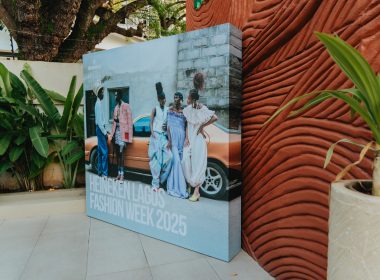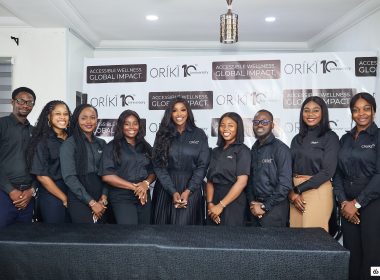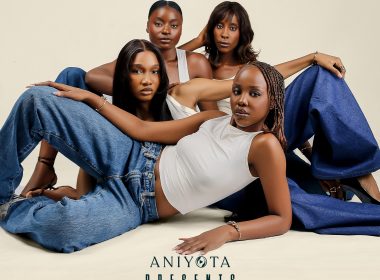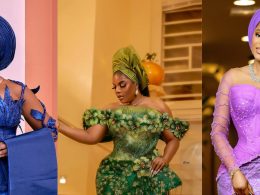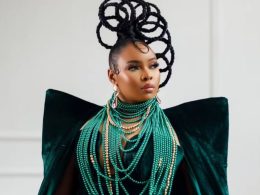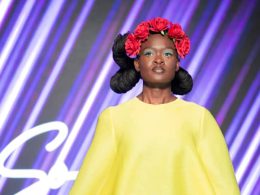Modern takes on traditional Nigerian attire reflect a dynamic blend of culture and style. Contemporary fashion designers are reimagining classic pieces using modern cuts, fabrics, and silhouettes while preserving the rich heritage of traditional textiles like Aso-Oke, Ankara, Adire, and Akwete. From everyday wear to special occasions, Nigerian fashion continues to evolve, celebrating cultural identity with a modern twist.
Blending Tradition and Modernity in Nigerian Fashion
Today, designers actively reinvent traditional garments like the agbada, iro, buba, and gele by incorporating contemporary twists. As a result, these timeless pieces now resonate more with today’s fashion-forward audience. Moreover, the blend of heritage and modernity ensures these styles remain both relevant and appealing.
Modern Interpretations of Nigerian Traditional Fashion
Designers and influencers are creatively fusing tradition with innovation. Here’s how:

Her outfit features a custom blend of Ankara and lace, paired with mesh/netted fabric. Ankara, a vibrant African wax print, stands out for its bold and colorful patterns.. The outfit has a modern, stylish cut with cutouts and elegant detailing.

Additionally, this outfit showcases a modern take on traditional style, as designers craft it from contemporary Aso Oke/Jacquard fabric. Furthermore, the use of these updated materials adds a refined and fashionable edge to the overall look. The detailed weaving and intricate patterns suggest a rich, structured textile, often tailored for fashion-forward traditional looks.

Moreover, her outerwear features handwoven or loom-woven fabric, possibly incorporating Aso Oke or Kente-inspired strips. Despite the traditional roots of the material, the overall styling embraces a contemporary aesthetic. As a result, the piece strikes a balance between cultural heritage and modern fashion. The vibrant and mixed patterns suggest a blend of African woven textiles and modern fashion.

Ankara fabric is more than just a colorful textile; in fact, it serves as an integral part of cultural expression in many African communities. Moreover, its vibrant patterns and symbolic designs often reflect social status, identity, and heritage. Consequently, Ankara continues to play a vital role in preserving and celebrating African traditions. This vibrant fabric influences identity through art, fashion, and social dynamics.
- Remixed Fabrics: Traditional textiles like Aso-Oke, Ankara, and Adire are used in modern pieces like blazers, jumpsuits, crop tops, and trousers.
- Innovative Styling: Think Aso-Oke blazers worn over denim jeans or Adire skirts styled with sneakers—these combinations make traditional fashion relevant for modern lifestyles.
- Hybrid Collections: Nigerian fashion houses like Lisa Folawiyo’s are launching hybrid collections that blend beadwork, sequins, and embroidery with traditional prints for red carpet-ready ensembles.
- Custom Creations: Many fashion designers now offer bespoke traditional outfits that reflect individual style while honoring cultural heritage.
Key Features
- Vibrant Colors and Patterns: Bright, bold hues dominate modern Nigerian fashion, with patterns that tell stories and reflect tribal identities.
- Comfort Meets Elegance: Contemporary designs prioritize wearability, allowing traditional attire to be worn casually or formally.
- Cultural Accessories with a Twist: Modern interpretations of traditional accessories—such as silk turbans, statement jewelry, and leather sandals—enhance the final look.
- Gender-Inclusive Styles: Both men and women now embrace a wider range of cuts and combinations, allowing more personalized expressions of style.

Why Modern Nigerian Fashion Matters
The fusion of traditional and contemporary styles isn’t just a trend—it’s a movement. It promotes cultural pride, sustainability through local fabrics, and economic growth for local artisans and fashion designers.
Keep reading for Ankara-related articles

